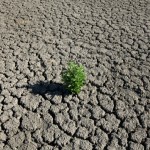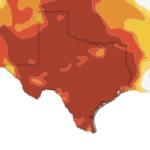Rejoice! This Summer Will Likely Not Be as Hot as the Last One
Anybody who lived in Texas last summer will tell you it was hot. Really, really hot.
It was the hottest summer on record statewide. Numerous cities, including Austin, Houston, and Dallas saw their heat records shattered by the high temperatures. Austin, for example, experienced 90 days of heat 100 degrees or over, including 27 days straight of triple digits heat from mid July to August.
It was hot.
So it might come as a relief to Texans that this summer will very likely not be as hot as last. In fact, John Nielson-Gammon, the State Climatologist, says it’s basically a sure thing.
“The rain we’ve had is a good start,” Nielson-Gammon, told StateImpact Texas this week. “It means it won’t be as hot this summer no matter what else happens.”
Just how does that work?
Here’s how Neilson-Gammon described it in our interview:
“When the sun’s solar energy hits the ground there are two things that can happen to it. It can cause the ground temperature to increase, or some of that energy can be used to evaporate water. So if there’s no water to evaporate, all of that energy has to go into heating, there’s no alternative,” he said.
“So whenever it’s a wet summer in Texas it tends to be relatively cool, and when it’s a dry summer it tends to be relatively warm. It’s a very strong correlation. Last summer was the driest on record and the hottest on record.”
Neilson-Gammon says the water already in the soil from our wetter-than-average winter will act as insurance against the kind of solar heating we saw last year. “I really don’t think it will [be as hot] because of that rain.”
He says this summer will also prove to be an interesting test-case for a relatively new climatological theory.
“The Atlantic Ocean is running near or cooler than normal, which is a switch from what it has been the past several years. And there’s been some recent research that says when the Atlantic Ocean is warm the Southern United States tend to be dry, and when the Atlantic is cool we tend to be wet, because when the Atlantic is warm that’s where all the thunder storms take place and it essentially draws the moisture away from us,” said Neilson-Gammon, “So this summer will be a test of that.”
“Now that its relatively cool in the Atlantic and will be a quiet hurricane season we may see some regular summer showers that we haven’t been getting in a long time,” he added.
But before you start planning your mid-August camping trip, there’s a few important things to remember.
First, this is Texas we’re talking about. Even with cooler temperatures than last year, it could still be excruciatingly hot outside.
“Last summer was maybe a one-in-100, one-in-500 event. So it’s pretty easy to say it won’t happen next year, because the odds are in your favor,” Neilson-Gammon explained.
Second, not all of the state got the winter rainfall that has Neilson-Gammon confident that temperatures will be lower. In fact much of the Western part of the state is still in the highest level of drought, and the rest of the state could slip back into drought easily. That could put us back into a vicious cycle, where dry weather exacerbates the heat and the heat encourages more dry weather.
“In the summer, you can get drought with just a couple months of dry weather,” cautions Neilson-Gammon.
Nevertheless, the upbeat predictions of cooler, wetter weather are a welcome change of pace for those of us that lived through last summer’s heat.
Did I mention how hot it was?




